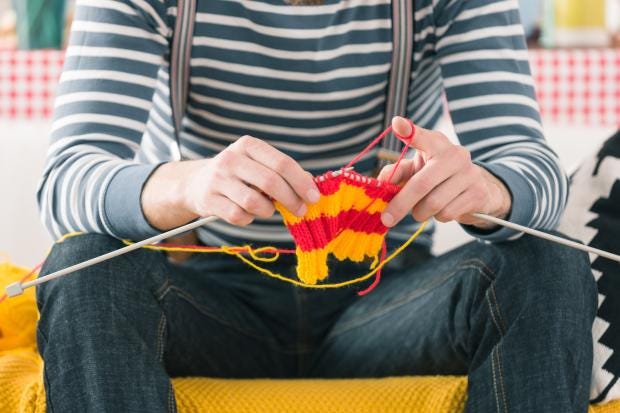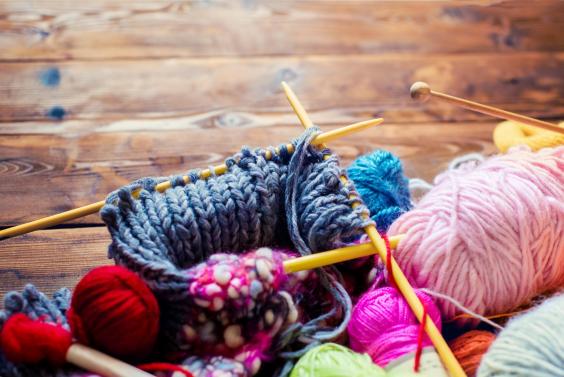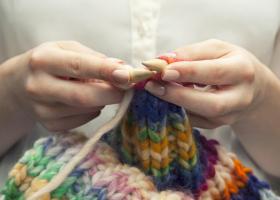

Knitting can reduce anxiety, depression, chronic pain and slow dementia, research reveals
The research suggests knitting could save the NHS millions of pounds
| 7K |
Click to follow
Indy/Life
Indy/Life
Knitting won’t just result in a new sweater -
research has found the hobby can also reduce depression and anxiety,
slow the onset of dementia, and distract from chronic pain.
Published by Knit for Peace, the findings are the result of extensive research into previous studies analysing the benefits of knitting, as well as the initiative’s own research.
According to Knit for Peace, a network of over 15,000 knitters in the UK who knit for people in need, there is substantial evidence that suggests knitting is beneficial to a healthy mind and body.
The group decided to investigate the matter after numerous members reported improved overall health after taking up the hobby - and it turns out the relaxing craft can be credited for numerous health benefits.
“There is an enormous amount of research showing that
knitting has physical and mental health benefits, that it slows the
onset of dementia, combats depression and distracts from chronic pain,”
states the report.
One of the studies, a 2007 study conducted by Harvard Medical School’s Mind and Body Institute, found that knitting lowers heart rate, by an average of 11 beats per minute, and induces an “enhanced state of calm,” similar to that of yoga.
In addition to its calming effects, knitting a quilt or a pair of mittens can distract from chronic pain - as focus is turned elsewhere. And the repetitive movements required to create a pattern release calming serotonin, which can lift moods and dull pain, according to the findings.
And a 2011 study conducted by the Mayo Clinic of over 70-year-olds found that those who knit had a “diminished chance of developing mild cognitive impairment and memory loss.”
Additionally, the hobby, which is often associated with elderly, can help fight loneliness, a plague that affects 1.2 million older people in the UK, and increase a sense of usefulness and inclusion.
“It is a sociable activity that helps overcome isolation and loneliness, too often a feature of old age. It is a skill that can continue when sight and strength are diminished,” the report states.
The findings were also supported by Knit for Peace’s own survey of 1,000 members.
 According to the survey, 70 per cent stated they believe
that knitting improves their health - the main reason being that it
makes them feel relaxed.
According to the survey, 70 per cent stated they believe
that knitting improves their health - the main reason being that it
makes them feel relaxed.
Survey respondents also revealed that knitting helps them deal with chronic pain, with 21.4 per cent reporting knitting helps relieve the pain of arthritis.
Knit for Peace hopes the findings will encourage more people to take up knitting, as they believe it could diminish the need for doctors visits.
“Every GP appointment costs around £45 but we believe knitting could help prevent people needing to visit the doctor so much, and help them feel happier, less isolated, and more healthy,” states the report.
As the NHS spends an annual £26 billion tackling dementia, and an additional £300 million on antidepressants, according to the NHS's annual report, knitting could be the answer to lower medical costs.
So the next time your grandma offers to teach you to knit, take her up on the offer.
Or you could always turn to YouTube, where there are hundreds of knitting tutorials for beginners.
Published by Knit for Peace, the findings are the result of extensive research into previous studies analysing the benefits of knitting, as well as the initiative’s own research.
According to Knit for Peace, a network of over 15,000 knitters in the UK who knit for people in need, there is substantial evidence that suggests knitting is beneficial to a healthy mind and body.
The group decided to investigate the matter after numerous members reported improved overall health after taking up the hobby - and it turns out the relaxing craft can be credited for numerous health benefits.
ADVERTISING
One of the studies, a 2007 study conducted by Harvard Medical School’s Mind and Body Institute, found that knitting lowers heart rate, by an average of 11 beats per minute, and induces an “enhanced state of calm,” similar to that of yoga.
In addition to its calming effects, knitting a quilt or a pair of mittens can distract from chronic pain - as focus is turned elsewhere. And the repetitive movements required to create a pattern release calming serotonin, which can lift moods and dull pain, according to the findings.
And a 2011 study conducted by the Mayo Clinic of over 70-year-olds found that those who knit had a “diminished chance of developing mild cognitive impairment and memory loss.”
Additionally, the hobby, which is often associated with elderly, can help fight loneliness, a plague that affects 1.2 million older people in the UK, and increase a sense of usefulness and inclusion.
“It is a sociable activity that helps overcome isolation and loneliness, too often a feature of old age. It is a skill that can continue when sight and strength are diminished,” the report states.
ADVERTISING

Knitting can make you healthier
Survey respondents also revealed that knitting helps them deal with chronic pain, with 21.4 per cent reporting knitting helps relieve the pain of arthritis.
Knit for Peace hopes the findings will encourage more people to take up knitting, as they believe it could diminish the need for doctors visits.
“Every GP appointment costs around £45 but we believe knitting could help prevent people needing to visit the doctor so much, and help them feel happier, less isolated, and more healthy,” states the report.
As the NHS spends an annual £26 billion tackling dementia, and an additional £300 million on antidepressants, according to the NHS's annual report, knitting could be the answer to lower medical costs.
So the next time your grandma offers to teach you to knit, take her up on the offer.
Or you could always turn to YouTube, where there are hundreds of knitting tutorials for beginners.


No comments:
Post a Comment